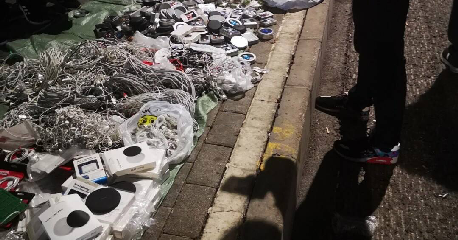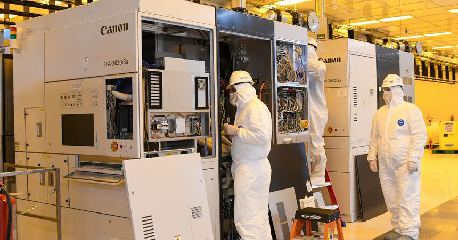
The chip shortage over the past two years has led to a huge "underground chip market" in China, with hundreds of middlemen forming an opaque "grey market" filled with second-hand or older chips, Bloomberg News reported. , and the price can sometimes soar to 500 times the original price. These chips have flowed into the supply chain, especially in the automotive industry, which also puts the quality and even the safety of the car at risk, and if it fails, it can be life-threatening.
Bloomberg pieced together the workings of the complex network after interviewing more than a dozen industry figures who asked not to be named because of the sensitivity of the matter.
The report said, for example, in a two-bedroom apartment in the suburbs of Shenzhen, 32-year-old Ms. Wang received a lot of messages, one of which read: "SPC5744PFK1AMLQ9, 300 pc, 21+. Is there a demand?" This string of codes refers to A chip produced by NXP is used in automotive microcontrollers. The production year is after 2021. The sender tried to find a buyer for 300 of these chips, and Ms. Wang and her team of six matched it. middlemen in such transactions.
Substandard chips penetrate into the automotive supply chain, and the security is a concern
As global chip shortages begin to disrupt the supply of goods in various fields such as smartphones and automobiles at the end of 2020, such informal chip dealers have become increasingly important, forming a huge underground market. Now that the United States has implemented new export controls, industry insiders believe it will further stimulate such underground chip transactions.
Cui Dongshu, secretary-general of the All-China Passenger Car Federation, said: "The United States has imposed sanctions on Chinese chips. The market is in a mess, and the price is also messed up. The pipeline is also messed up. Low-end and high-end chips have a panic mentality, and now they are all in chaos."
Bloomberg reported that many middlemen pointed out that substandard chips have penetrated into the supply chain, affecting the quality and even the safety of cars. For example, if a bad chip in a car's ABS brake module fails, it could be life-threatening.
Some Chinese automakers asked German auto parts supplier Robert Bosch to use chips it sourced from the gray market to process auto parts, but Bosch eventually refused, arguing the chips could harm its components, people familiar with the matter said. completeness.
Although business operations like Ms. Wang's are legal because they are all registered as companies and pay taxes, it is difficult to determine the source of chips bought and sold on the gray market. The chips may have come from questionable sources, such as private sales to authorized agents who may knowingly or inadvertently place overorders with the manufacturer, or private sales by legitimate businesses in violation of their agreements with the original chip manufacturers. Some middlemen also try to make money by stockpiling and price gouging.
Ms Wang said the traditional mechanism of auto suppliers placing orders through authorized agents and then waiting for distribution from original chip manufacturers has broken down.
Intense competition from Chinese carmakers turns to the underground chip market to grab goods
The report pointed out that these semiconductors are used in many components of automobiles, from electronic braking systems to air conditioning and window control components. The semiconductors required for these microcontrollers have been difficult to source for a period of time. Reactions to this have varied, with Toyota and Volkswagen directly delaying production and deliveries, and Tesla developing new software and using alternative semiconductors; however, Chinese automakers especially prefer to use chips from this gray market due to intense competition.
According to people familiar with the matter, China's three major electric vehicle start-ups, Weilai, Xiaopeng and Ideal, have tried to buy chips through these unauthorized middlemen. In fact, except for BYD, which has its own chips, almost all Chinese Automakers are trying to source semiconductors this way.
Citing people familiar with the matter, Bloomberg reported that Li Auto had purchased a brake chip from a middleman for the equivalent of more than $500, which was only about $1 before the outbreak. A representative for Ideal Motors denied that, but declined to comment further. Spokesmen for NIO and Xiaopeng also declined to comment.
This grey market transaction mainly occurs on the Internet, such as WeChat groups or emails, but sometimes also occurs in physical markets such as Shenzhen SEG Plaza and Huaqiangbei. Get an order. Of course, the Chinese government has also banned them. For example, in August last year, it launched an investigation into possible price manipulation and fined three middlemen 2.5 million yuan ($350,000) for selling automotive chips at significantly higher prices. But in a market where automakers are desperate for supply, such fines are no deterrent.
Used chips come from scrapped car parts, chip quality inspectors come into being
China's sub-chip market didn't emerge overnight, and while it existed long before the semiconductor shortage, it didn't flourish until many believed it was lucrative. "Everyone is a speculator," said one middleman.
To prevent someone from being able to trace the source of the chip, middlemen often wipe off labels or information from the packaging. While counterfeit chips are uncommon, several automakers have fallen into the trap of sourcing used chips from scrapped car parts. The used chips will be sold as new, the people said.
Phil Koopman, associate professor of electrical and computer engineering at Carnegie Mellon University, said: "Recycling chips can cause problems, such as they may be built for a temperature range that is too small. More importantly, chips can be damaged over time, so Chips that are reused may fail sooner than expected."
Such risks have even spawned "chip quality inspectors," often former employees of chip companies or authorized agents, who claim they have the ability to verify the labels or packaging of such gray-market chips, and even use X-rays to inspect them. these chips.


